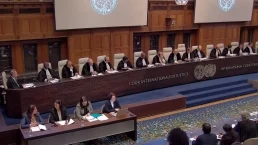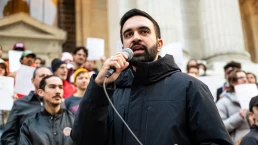An adverse ICJ ruling on Nicaragua in 1984 shows how the U.S. subverts international law when it chooses.
By Jon Schwarz, The Intercept
On Friday, the International Court of Justice — part of the United Nations — issued an interim ruling in the case initiated by South Africa asserting that Israel “is committing genocide in manifest violation of the Genocide Convention.” What happens now?

The court did not make a determination on South Africa’s first request, which was to instruct Israel to “immediately suspend its military operation in and against Gaza” — i.e., engage in a ceasefire.
However, the ICJ did demand that Israel take actions that for all intents and purposes do require it to stop its assault on Gaza. “Israel must,” the ICJ stated, “take all measures in its power to prevent the commission of all acts within the scope of Article II of this [Genocide] Convention, in particular: (a) killing members of the group [i.e., Palestinians in Gaza].”
If history is anything to go by, the United States will now step in to prevent any enforcement of the ICJ’s ruling. While it’s totally forgotten today by Americans — and indeed was barely noticed at the time — the ICJ responded to a complaint from Nicaragua during the 1980s by ruling that the U.S. had violated international law in numerous ways by mining Nicaragua’s harbors and supporting the Contras in their attempt to overthrow the country’s Sandinista government.
Recent Posts
Politicians Are Betraying Gen Z On Climate
July 10, 2025
Take Action Now While Gen-Zers thrift, knit, crochet, and find other ways to reduce our footprints, Trump and the GOP are greenlighting more climate…
Trump’s Deportation Threat Against Zohran Mamdani Is Shameful
July 10, 2025
Take Action Now In only half a year of Donald Trump’s presidency, he and his allies have turned deportation into an explicitly political threat…
Teachers Union Votes To Cut Ties To The Anti-Defamation League
July 10, 2025
Take Action Now In a momentous vote, the National Education Association voted to cut all ties with the Anti-Defamation League. The reason? “Despite…
2025 War Abolisher Awards Go To Albanese, Nader, Waters
July 9, 2025
Take Action Now The purpose of the awards is to honor and encourage support for those working to abolish the institution of war itself.By World…




